Why the US decided to give peace in Gaza a chance
Washington was in a difficult position at the UN Security Council over its traditional ally

In a historic move on Monday, the United Nations Security Council (UNSC) achieved a breakthrough by passing a binding resolution aimed at securing a “lasting, sustainable ceasefire” in Gaza and advocating the release of all hostages held by Hamas since the October attacks on Israel last year.
This momentous step forward in international diplomacy signals a potential turning point in the protracted Israeli-Palestinian conflict, offering a glimmer of hope for peace in a region long plagued by violence and discord.
The decision by the UNSC comes after several failed attempts to broker a ceasefire. It underscores the growing global consensus on the urgent need to address the root causes of the conflict and pave the way for a peaceful settlement. The resolution, which was passed with overwhelming support from the international community, reflects a shared commitment to upholding international law and promoting stability in the region.
The US, traditionally a staunch ally of Israel, notably abstained from vetoing the resolution this time, signaling a shift in its approach and a willingness to engage constructively in multilateral efforts to end the violence – though it has said that it does not represent a change in policy. This decision reflects a recognition of the need for a balanced approach that takes into account the legitimate concerns and aspirations of both Israelis and Palestinians.
With the UNSC resolution now enshrined as international law, all UN member states are bound by its provisions, setting a clear mandate for concerted action to implement its objectives. This presents a unique opportunity for diplomatic initiatives and coordinated efforts to de-escalate tensions, rebuild trust, and create the conditions necessary for lasting peace and stability in the region.
However, despite the optimism surrounding the UNSC resolution, significant challenges remain on the path to peace. The Israeli government, led by Prime Minister Benjamin Netanyahu, has vowed to carry out operations in Rafah, a densely populated area where millions of displaced Palestinians now reside. This escalation threatens to further exacerbate tensions and undermine efforts to achieve a ceasefire and pave the way for meaningful negotiations.
Moreover, Israel’s position as a key strategic ally of the United States poses a dilemma for Washington, which has long maintained unwavering support for Israel’s security and sovereignty. While the US remains committed to its alliance with Israel, the changing geopolitical landscape and evolving strategic priorities have complicated its stance on the conflict.
The Biden administration faces pressure from both domestic and international stakeholders to balance its support for Israel with a commitment to upholding international law and promoting peace in the Middle East. Should the US allow Israel to destroy the last remaining Palestinian holdout in Gaza, Biden will almost certainly lose the 2024 presidential election to Donald Trump. Additionally, relations with Muslim countries would be shattered beyond repair, as well as endangering US military personnel in the region.
The prospect of a full-scale war looms large, with Israel’s military capabilities and the broader implications of its actions raising concerns about the potential for a regional conflict. The possibility of an invasion by neighboring Arab states adds another layer of complexity to an already volatile situation, highlighting the need for concerted diplomatic efforts to prevent further escalation and find a peaceful resolution to the crisis.
Further, Israel’s nuclear ambiguity and so-called “Samson Option,” its rumored unofficial retaliatory policy, raise serious questions about whether spillover in the conflict, prompted by the state’s potential ground operation in Rafah, could trigger a international thermonuclear war. The situation in the Middle East thus represents a major threat to international security, underscoring why major countries like Russia, China, and Brazil have been adamant about a ceasefire.
Despite these challenges, there are reasons for cautious optimism. The UNSC resolution represents a significant step forward in international efforts to address the Israeli-Palestinian conflict and provides a framework for meaningful dialogue and engagement. By building on this momentum and redoubling efforts to promote reconciliation and mutual understanding, there is hope for a brighter future for the people of Gaza and the wider Middle East.
While the road to peace remains long and arduous, the UNSC resolution offers a ray of hope in an otherwise bleak landscape. By seizing this opportunity and working together in good faith, the international community can help pave the way for a just and lasting peace in the region. Now is the time for bold leadership, unwavering commitment, and a shared vision of a future defined by cooperation, coexistence, and prosperity for all.
The statements, views and opinions expressed in this column are solely those of the author and do not necessarily represent those of RT.
https://www.rt.com/news/595006-us-give-peace-gaza/




0 Comments:
Post a Comment
Subscribe to Post Comments [Atom]
<< Home